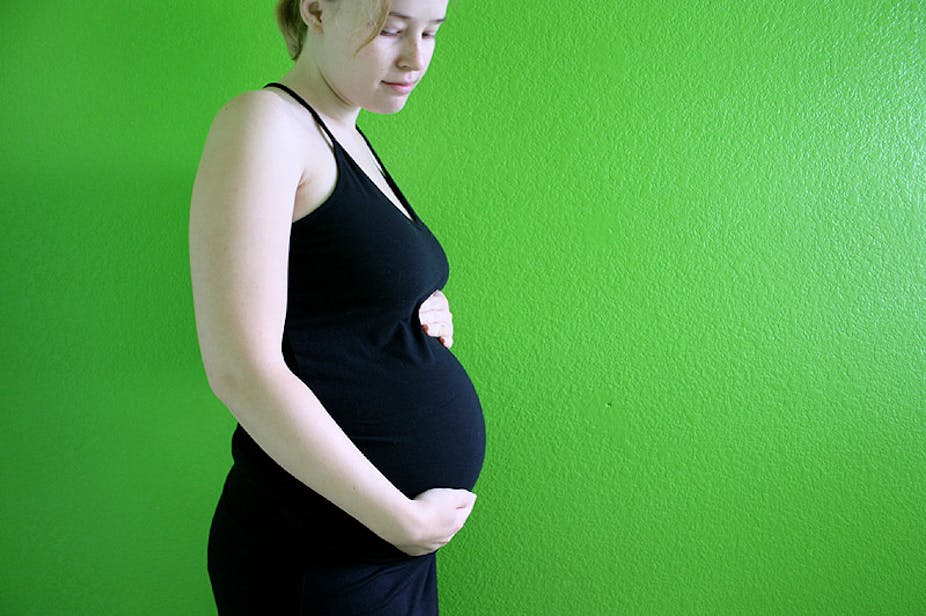Stop press! Actress Julia Roberts has been spotted in a Prius and is reportedly into reusable coffee cups and solar panels.
According to media reports, it was the birth of her twins, rather than her Oscar-winning turn as environmentalist Erin Brockovich, that inspired her green transformation.
Motherhood and the environment
This tidbit of celebrity gossip illustrates the popular idea that mothers are generally “greener” than the broader population.
Our recent research explored this idea. It aimed to identify where having children appears to make a difference in women’s reported environmentally relevant household behaviour. It also explored what these behaviours mean to new mothers.
It adds to the small but growing body of evidence that gender and parenthood can affect environmental values, attitudes, concerns and behaviours.
Researchers have also described the “motherhood effect”, where the social role of women as nurturers and carers of children leads them to greater concern about environmental problems.
While women are more likely to report environmental concerns and behaviours, this doesn’t extend to higher levels of activism. “Eco-mums” appear to be more Julia Roberts than Erin Brockovich.
In contrast, recent Australian Bureau of Statistics figures show that when a couple adds children to the household group, its energy and petrol use increases. This paints a picture of conflicting emotions as new mothers reconcile the impacts of their increased consumption and their heightened environmental concern.
Add to this the guilt felt over nappy choices and the contribution to the planet’s growing population. It’s little wonder the term “eco-mom” has been called an oxymoron.

Exploring motherhood and sustainable living
One challenge for environmental behaviour change is that many of our resource using behaviours are habitual. They’re regular, automatic and cued by the surroundings they’re performed in. This makes them resistant to change.
Becoming a mother is all about change: changing priorities, attitudes, social groups, habits and lifestyles. One emerging theory suggests events that disrupt habits, like having a baby, create teachable moments: opportunities to learn better habits.
Our research used a mixed-methods approach. We began with an analysis of existing data from two surveys, provided by the NSW Office of Environment and Heritage and Sustainability Victoria. We compared women with and without children.
The results of our analysis were mixed, but suggest women with children are more likely to perform some of the pro-environmental behaviours that could be linked with their child’s wellbeing or are easy to do.
For example, women with children were more likely to say they’ve disposed of chemicals through special collections. Those with young children were most likely to use cold water for clothes washing.
Mothers’ perspectives
Based on the quantitative findings, we conducted in-depth interviews with eight new mothers living in Melbourne to see how they describe and account for their own changes in behaviour since having children.

As expected, nappies dominated mothers’ talk around environmental issues. However, the conversations all revealed dramatically increased energy use, and changes in cleaning behaviours and transport habits.
New mothers talked about these behaviours in connection with their baby’s wellbeing, rather than in connection with the environment. It appears “green” is in the eye of the beholder.
While academics, environmentalists and government authorities might view energy use in relation to climate change, our research suggests new mothers don’t. Instead, they see energy use as necessary for keeping their baby warm and comfortable.
Similarly, preferences for greener cleaners were motivated by concerns over exposure to “chemicals”, with benefits to the broader environment viewed as a bonus. Walking was preferred over driving for short trips because it’s good exercise and more convenient.
Mothers were somewhat concerned about the amount of money they spend on energy, particularly where maternity leave resulted in a loss of income. They wanted to reduce their energy use, and therefore bills, though not at the expense of their child’s comfort.
Mothers also talked about the pressures of the multiple demands of motherhood, time and financial constraints, tiredness and negative emotions, like guilt and anxiety.
Overall, our research suggests the pro-environmental behaviours that are adopted by new mothers are really pro-health or money-saving behaviours from their point of view.
An important side note is that mothers’ talk revealed a high use of social media and the internet to seek social connection, information and advice. With mothers increasingly empowered to seek their own advice, this has implications for the spread of information and misinformation.

Is motherhood an eco-opportunity?
Our research illustrates that the transition to motherhood is indeed a time of change — for better or worse — in environmental behaviour. This may be an opportunity for encouraging sustainable behaviour.
Behaviour change initiatives for new mothers can benefit both the environment and families by focusing on pro-environmental behaviours that are also health promoting or that ensure low-cost thermal comfort, and framing behaviours in these terms. Their designs should also account for the changing ways new mothers gain information and advice.
The underlying message for promoting sustainability is the importance of understanding your audience. By tailoring the target actions and messages to their needs, interests and meanings — not necessarily your own — you’re more likely to achieve what you’re aiming for.
After all, to paraphrase John F Kennedy, our most basic common link is that we all inhabit this planet… and we all cherish our children’s future.

